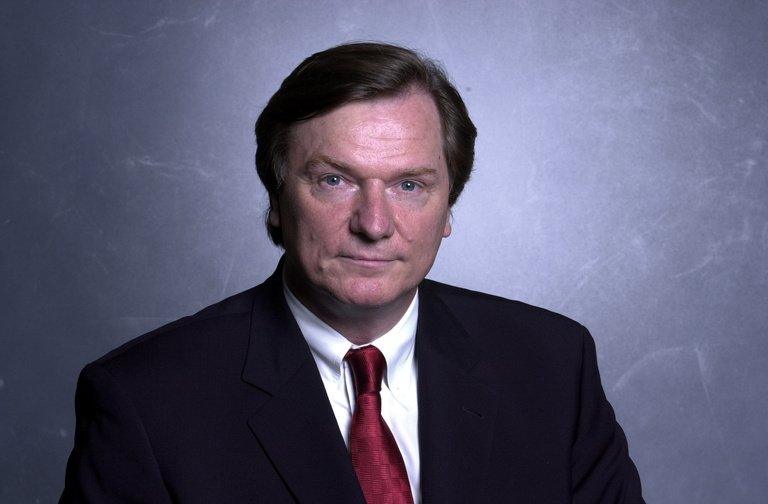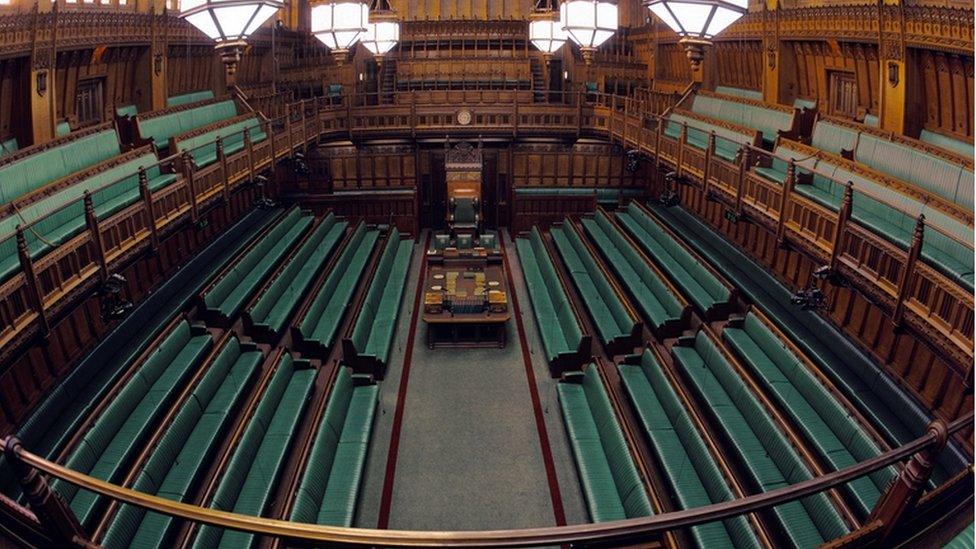The week ahead
- Published
There are a couple of votes in the Commons this week, where ministers might be defeated.
Potentially the government could suffer defeats over metro mayors in the Cities and Devolution Bill, and over English votes for English laws, but its narrow majority is only in danger if Labour MPs can muster enough cohesion to vote with Conservative rebels and after the experience of the vote on the fiscal charter this week, that's quite a big "if".
One for the cognoscenti is the attempt by the Labour MP Graham Allen, a wily ex-whip, to use his Westminster Hall debate last week to force a vote on the floor of the Commons; his little-noticed debate was designed to keep up the pressure for the creation of a house business committee, external, to control the agenda of the Commons. At the end of his debate, Mr Allen called for the equivalent of a vote, an unprecedented move, and the result is that this matter can now appear for resolution on the floor of the house. However, there is no possibility that the government would allocate any time for MPs to hold a division, so he is appealing to the backbench business committee to allocate 15 minutes for a vote without debate. I would be amazed if it happened, but you never know.

Graham Allen MP
Here's my rundown of the main chamber activity for the coming week:
Monday October 19th
The Commons meets at 14:30 (BST) for defence questions. After that the Prime Minister will give a statement on the latest meeting of the European Council, which seems likely to focus mostly on the refugee crisis.
Then, there is quite an unusual Commons event, an emergency debate, obtained by the shadow leader of the house Chris Bryant, on the (non)operation of the Wilson doctrine, this follows a court ruling that the doctrine, that MPs' phones will not be tapped and their mail will not be opened (this was 1966, remember) by the security services, has no legal force. The debate is likely to become a vehicle for cross-party demands for some kind of explicit legal privilege to protect the parliamentary work of MPs and Peers. An early day motion, external has been signed by key figures including the Conservative David Davis, the SNP's Alex Salmond and the Greens' Caroline Lucas, among others.
All of which leaves rather little time to debate the second reading of the Psychoactive Substances Bill and there may be complaints about that. The day ends with an adjournment debate on the mitigation of noise around Heathrow airport, led by Bracknell MP, Dr Phillip Lee.
In Westminster Hall (16:30 BST) there is a debate on an e-petition on immigration that "the UK government need to prevent immigrants from entering the UK immediately! We MUST close all borders, and prevent more immigrants from entering Britain. Foreign citizens are taking all our benefits, costing the government millions! Many of them are trying to change UK into a Muslim country!" In his role as a member of the petitions committee the Conservative, Paul Scully, will lead the debate.
In the Lords (14.30 BST) the main legislative action is the first report stage day on the Energy Bill, the big issues include; the oil and gas authority's principle objective to include overseeing re-use of oil and gas infrastructure in the North Sea for carbon transportation and storage of greenhouse gases; requiring a government consultation to force petrol companies to contribute to the development of zero carbon emissions technologies in the UK; and requiring the government to develop, promote and implement a comprehensive national strategy for carbon capture and storage (CCS). Rising Tory star Lord Bourne of Aberystwyth leads for the government.
That is followed by a motion to approve the draft Modern Slavery Act 2015 regulations 2015.
Tuesday October 20th
The Commons day opens (11.30 BST) with foreign and commonwealth questions. And then there is an interesting ten minute rule bill from the former director of public prosecutions, Sir Keir Starmer, now a Labour MP. He wants to give victims of crime new, enforceable rights. It is an unusually detailed offering for this subspecies of bill and already has a galaxy of cross-party supporters, including, I am told, the former solicitor general, Sir Edward Garnier. I suspect this is just a first step in a Commons campaign.
MPs then move on to a Labour opposition day debate on tax credits, a key campaign theme for Labour. And the day ends with an adjournment debate on the regulation of cosmetic surgery led by Labour's Kevan Jones. It is centred on the case of a constituent who has been left unable to close her eyes following a cosmetic operation, carried out by a surgeon who, despite not being insured in the UK, is still licensed by the General Medical Council.
The two big debates in Westminster Hall are on the availability of cancer drugs (9.30 - 11:00 BST) led by the DUP's Jim Shannon, and on air passenger duty and regional airports (14:30 - 16:00 BST), led by Solihull Conservative Julian Knight.
In the Lords, (from 14:30 BST) two more new peers take their seats: Lord Arbuthnot of Edrom, the former Conservative chief whip, James Arbuthnot and Lord Polak - the former Conservative friends of Israel director Stuart Polak.
The main business is the second reading of the Education and Adoption Bill - which deals with the conversion of schools into academies and allows local authorities to transfer their adoption responsibilities to a different council or a voluntary adoption agency.
Wednesday October 21
The Commons sits at 11.30 BST for Cabinet Office questions, followed, at noon by Prime Minister's questions.
Then there's a ten minute rule bill from the Conservative former children's minister Tim Loughton to allow opposite sex couples access to civil partnerships. He says there is an unintended anomaly in the law. where opposite sex couples, who do not want to go down the formal marriage route (and there are almost 3 million cohabiting opposite sex couples) are completely unrecognised in the eyes of the state. Given that 40% of them have children this is a large body of people and they have few protections if things go wrong. Many, he argues, are living under the complete misconception that they are protected by 'common law marriage' which does not formally exist.
The day's main legislating is detailed scrutiny of the cities and local government devolution legislation by a committee of the whole house. Given that this bill only passed its second reading on Wednesday, and the date of this committee stage was only revealed on Thursday, quite a number of MPs are rather miffed about the timing. The deadline for amendments was Friday afternoon, so they had a little over a day to propose detailed changes. Which makes it an interesting test for Labour's new shadow communities secretary, John Trickett and his team.
The government may be seeking to move fast to get the bill into law by Christmas, in order to allow a number of city regions to elect the new-look metro mayors in May. But there may be a stumbling block or two. The bill has already been debated in the Lords where peers removed the requirement for metro mayors to be installed, in return for the devolution of substantial powers from central government to the city regions. The government will seek to reinstate it, the chancellor is particularly enthused, but there will doubtless be counter-amendments to require that the creation of these mayors, who will operate across several local authorities, be put to a referendum. Smart judges of the Commons suspect there are enough Conservative rebels on this issue to cause the government real trouble. Tellingly, Graham Brady, the uber-influential chair of the 1922 committee, has amendments down to allow local authorities to pull out of metro-authorities if they don't like them.
The day's big Westminster Hall debates are on the UK science budget (11 - 11.30 BST) and black history month (14.30 - 16:00 BST)
In the Lords (15:00 BST) after questions to ministers, it is day two of the report stage of the Energy Bill ( see above).
Then peers turn to the constitutional implications of the government's proposals to change the rules of the Commons to allow English votes for English laws (EVEL). Peers are miffed that their call for a joint committee of both houses to consider the idea has gone unanswered - I suspect a vote will be forced on a motion criticising the government, which could well add to the tally of defeats already accumulated since May.
Thursday October 22nd

MPs are to discuss English votes for English laws
The Commons opens (9.30 BST) with culture, media and sport questions, and that is followed by the regular domestic question time for the House of Commons Commission and leader of the house, expect more probing about when MPs and peers may have to move out to allow the restoration and renewal of their crumbling home.
The Leader, Chris Grayling, will stay on to deliver his weekly business statement, setting out the Commons agenda for the coming week and his marathon continues with a motion to change the commons standing orders to allow English votes for English laws. A vote on the idea before the summer was postponed, when it became clear there was stiff resistance from other parties and from Tory MPs who thought the plans went either too far, or not far enough. If the changes were voted down, it would be a pretty stinging defeat and it's far from impossible.
In the Lords (11:00 BST) the influx of new (mostly Conservative) peers continues: Lord O'Shaughnessy, the former director of policy to the Prime Minister, and Baroness Stroud co-founder and former director of the think-tank the Centre for Social Justice. Both will sit as Conservative peers.
Pick of the questions to ministers is former cabinet minister Lord Forsyth's on the criteria for political nominations to the House of Lords which might produce some interesting gripes about the newcomers.
Then peers move on to a series of debates led by backbenchers, including a waiting for Godot moment, as the Labour peer and former Attorney General, Lord Morris of Aberavon, leads a short debate on the Chilcot Inquiry.
Friday October 23rd
It's another private members bill day in the Commons, (9.30 BST) first up is Conservative defence expert Sir Gerald Howarth's Defence Expenditure (NATO Target) Bill - which suggests a legal requirement modelled on the one for international aid spending. Heidi Allen's Higher Education (Information) Bill is next, and it is possible MPs may work their way down the Order Paper perhaps as far as Peter Bone's EU Membership (Audit of Costs and Benefits) Bill.
And there are second reading debates for more private members bills in the Lords (10:00 BST).
First up is the Arbitration and Mediation Services (Equality) Bill] - from crossbencher Baroness Cox. Fellow crossbencher, Baroness Finlay of Llandaff has the Access to Palliative Care Bill (perhaps a follow-up to the debates on assisted dying) and Conservative Lord McColl of Dulwich has the Advertising of Prostitution (Prohibition) Bill. Unlike MPs, Peers will debate all the bills on the Order Paper - and will normally give them an unopposed second reading.
- Published11 September 2015